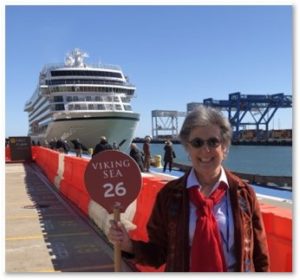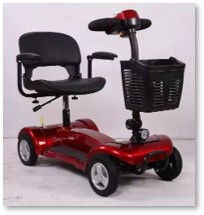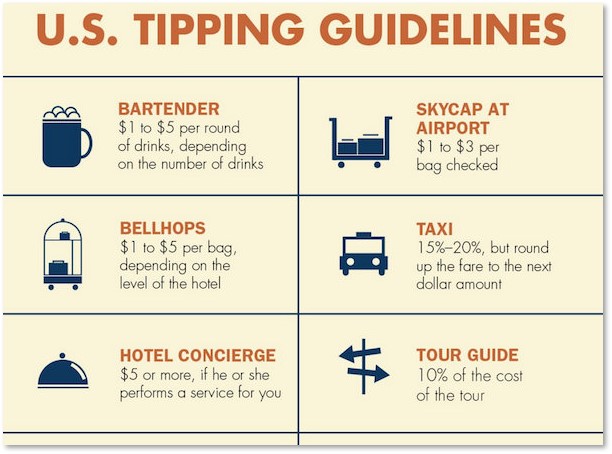 It’s August and prime tour season in many countries, including this one. So far this year, I have led tours of Boston for people from different countries and many states around the U.S. They come to Boston for the history, air that’s cooler than where they live, relief from the smoke of forest fires, and actual water falling from the sky. (It rained all of July.)
It’s August and prime tour season in many countries, including this one. So far this year, I have led tours of Boston for people from different countries and many states around the U.S. They come to Boston for the history, air that’s cooler than where they live, relief from the smoke of forest fires, and actual water falling from the sky. (It rained all of July.)
In that time, I have thought a lot about what I like in the guests who come on my tours—and what I like less. I have been a tour guide for eight years and also a tour guest here as well as in other countries. Using that experience, I created a list of things to keep in mind when you are or will be on a guided tour with a local tour guide. Here are my top six tips.
-
Be Realistic About Your Abilities
By that I mean, choose a tour commensurate with your abilities. A walking tour means exactly that. In parts of Boston, it means walking over uneven brick sidewalks, climbing steps or going uphill. Also, some tours are longer than others. Many elderly tourists have hip or knee problems—or are recovering from replacement surgery. Others are large of girth and not in good shape. These conditions affect how far you can walk or whether you can handle hills and steps.
Now, I understand the you may not want these conditions to limit what you can do. You want to go and tough it out, bum knee be damned. What you will actually do is hold up the tour for everyone else. While we wait for you to catch up, we lose the time that might have been spent on doing something a little extra or ending the tour on time. Other guests might miss dinner reservations or the last train home. Please be realistic—and considerate of others.
-
Arrive on Time
 Okay, this is just common courtesy but it also can work in your favor. Here’s one of the first questions many guests ask me “Is there a bathroom I can use?”
Okay, this is just common courtesy but it also can work in your favor. Here’s one of the first questions many guests ask me “Is there a bathroom I can use?”
If you check in 20 minutes before start time then, sure, I can send you to several places that are clean and available. If, on the other hand, you arrive with five minutes before show time, the options get a lot more limited.
Also, I start my tours on time so, if you come late, I will have to stop what I’m saying to check you in. That interrupts my story and affects the experience for the other guests. On-time arrivals may not always be possible given traffic, getting lost on the way, or the waiter who disappears just when you need to pay the check. But please try.
-
Don’t Get Lost
You may have a wandering spouse or partner—someone who dawdles to take a picture or needs a bathroom, or just has to buy a souvenir. Let them do it on their own while you stay with the tour. If you go searching, your guide will have to deal with two lost guests. On a walking tour, that may simply amount to losing a couple off the end of the tour who simply never catch up. We can’t stop the whole tour and go searching for you.
 It’s different on a bus tour. There, we count the number of passengers after each stop to make sure no one gets left behind. I once lost a man who went looking for his wife when he didn’t see her after disembarking from a harbor boat. When my count came up short, I checked the second bus but he wasn’t there, either. His wife and I looked around but he was nowhere to be seen.
It’s different on a bus tour. There, we count the number of passengers after each stop to make sure no one gets left behind. I once lost a man who went looking for his wife when he didn’t see her after disembarking from a harbor boat. When my count came up short, I checked the second bus but he wasn’t there, either. His wife and I looked around but he was nowhere to be seen.
The bus was on a tight schedule and the pier supervisor told me to keep going. When I asked the wife what she wanted to do—stay on the bus or look for her husband—she said, “I want to kill him.” Don’t be that guy.
-
Look Interested
You are the audience for your tour guide and performers will tell you they do a better job when the audience is responsive. Any baseball player who has ever been on the field at Fenway Park can testify to the impact of an engaged crowd. Going through a whole tour with guests who show no interest can be a real downer. Nothing flattens the energy of a tour like indifferent guests.
Last week I had four people who remained expressionless for the entire walking tour. It might have been cultural, but I couldn’t tell whether they were interested, bored, enthusiastic, aloof, fascinated, or apathetic. Nothing. It’s only natural, at least here in America, to engage more with people who respond to you. I like people who smile, show surprise, listen carefully, ask questions, or even share a comment with someone else. It means they’re interested and paying attention. Oh, and please give your guide a round of applause when he/she is finished. It’s a nice ego boost.
-
Be Considerate
Your tour guide is not a porter, concierge, servant, or personal shopper. Our job is to lead tours, tell you about our city/chateau/town/castle/cemetery, etc. and make sure you have a good time. I am happy to give directions or restaurant recommendations at the end but won’t go beyond giving information.
 Two years ago, a man rolled off a cruise ship on one of those motorized scooters and stopped at the baggage compartment. He stood by, expecting me to lift it into the belly of the bus. Had it been one of those lightweight collapsible rollators, I probably would have done it. But there was no way I was going to throw my back out hefting that thing in while he stood and watched.
Two years ago, a man rolled off a cruise ship on one of those motorized scooters and stopped at the baggage compartment. He stood by, expecting me to lift it into the belly of the bus. Had it been one of those lightweight collapsible rollators, I probably would have done it. But there was no way I was going to throw my back out hefting that thing in while he stood and watched.
I stepped back. The bus driver and the pier supervisor, both women of a certain age, wrestled the monster into the bus. Then he walked on and took his seat. I presume they wrestled it out again at the end but I didn’t hang around to watch.
-
Tip Well
Tipping conventions differ between America and other countries. Here in the U.S., tour guides have pay schedules in common with servers. Although we get paid, the bulk of our income derives from tips.
Now, I have never liked tipping. I prefer to look at a price, decide whether I can afford it, and act accordingly. But tipping is a reality and one that you come to appreciate when it makes the difference between just breaking even or making a profit.
One of the three groups I lead tours for is Boston By Foot, a volunteer organization. When no tips come in, I lose money on every tour. The other two, including Haunted Boston, are companies that pay me but I still need those tips to make a profit. Coming in to Boston means paying for gas, tolls, parking and sometimes lunch. The money I make leading tours contributes to my next vacation, so it’s important to me.
Unclear on Adulting
Young people have not yet mastered this part of “adulting.” Plus, they don’t tend to carry cash. Or think ahead. I countered that trend by getting a Venmo account and putting the information on cards that I can hand out.
 Almost every week I have a few tour guests who thank me, and just walk away. Last month I gave a private tour to a boy and his mother, who said she had intentionally gotten cash at the ATM but left it in her hotel room. I gave her my card but so far, Nada. Thanks, Mom.
Almost every week I have a few tour guests who thank me, and just walk away. Last month I gave a private tour to a boy and his mother, who said she had intentionally gotten cash at the ATM but left it in her hotel room. I gave her my card but so far, Nada. Thanks, Mom.
On the other hand, many people are very generous, which I appreciate. Leading tours means giving my guests between 90 minutes and two hours of person-to-person time. That doesn’t include travel time to and from, plus time spent checking everyone in. It’s nice to know they appreciate it.
Knowing the Tour Material
No matter where you take a tour, your guide has put considerable time and effort into learning the information. Usually, they also read, attend lectures, and do research so they can answer any questions knowledgeably. A tour guide almost always knows far more about their subject than they have time to say. I lead tours that cover history, art, geology, ghosts, architecture, disasters, crimes, civil engineering, important events, and land making.
A bus tour compresses that time even more. When that bus is rolling I have to talk fast to say more than a few lines about anything we pass. But, trust me, we know far more than you can imagine.
Guides in Different Flavors
Tour guides also come in different flavors and there’s no right or wrong way. Some take a very academic approach, delivering the material like a college lecture. Others convey the information in a conversational way. A few are hams. I’m a storyteller. With me, you get the information plus gestures, accents, jokes, questions, and descriptions. I also define unfamiliar words for kids so they can follow the story. Two hours of that constitutes a performance.
When you’re on a tour, you may not think—or even realize—all that has gone into making it a pleasant experience for you. We guides may have done the tour many times but we understand this is the first, and probably only, time you will take it. We want to make that experience enjoyable and perhaps even memorable for you.
These six tips will help you to do your part. I hope to see you when you come to Boston!

